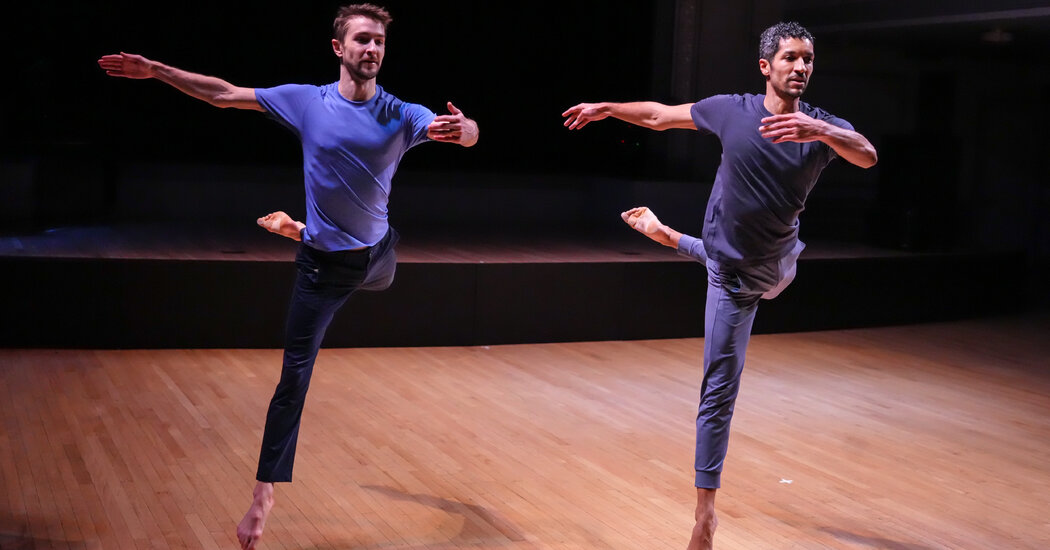The choreographer Molissa Fenley oversaw one of the most celebrated dance events of the deep pandemic days of 2020: a live-streamed revival of her fierce 1988 solo “State of Darkness,” set to Stravinsky’s “Rite of Spring” and performed by seven illustrious dancers. It made a splash.
Since then, Fenley has returned to working quietly on new material, building on her nearly 50 years of making dances as the founder of Molissa Fenley and Company. This week at Roulette in Downtown Brooklyn, she is presenting “From the Light, Between the Lamps,” a collection of short works created and updated over the past few years. Opening night, on Wednesday, felt like a private glimpse into her choreographic mind: no splashes, just a steady, rigorous exploration of movement to music.
The program’s greatest force is Fenley herself, who, at 69, dances with a searing clarity and equanimity, no matter the limitations that naturally come with age. A generosity radiates from her upright spine and notably long arms. (“It’s like she has two sets of legs,” a friend remarked, amazed.) This is not one of those shows in which a veteran artist makes a cameo to be momentarily revered. Fenley is in there the whole time, holding nothing back. She is joined by the dancers Christiana Axelsen, Justin Lynch and Timothy Ward, all in their 30s and 40s, and the pianists Michael Ferrara and Enriqueta Somarriba.
While the evening includes six distinct works, they could be chapters in the same story. The recurring themes are the lines and curves of Fenley’s limpid movement vocabulary, based in ballet and reminiscent of the Merce Cunningham technique, but developed, as she has said, around the idiosyncrasies of her own body. Arms pass through skewed and angular poses, legs sweep straight up to the side or hook into back attitudes, torsos tilt on their axes or twist in opposition to hips.
Reappearing, too, is a delicate yet palpable tension among bodies in space, which tend to orbit or graze past each other, or touch only lightly, more often than sharing their weight. In “Variation 5” of “Cosmati Variations,” to the eclectic percussion of John Cage’s Third Construction, Axelsen and Ward, tracing singular pathways that sometimes sync up, reminded me of planets that align in some fateful way once a century. As they gather speed in floor-gobbling leaps, they maintain the calm amplitude of more measured moments.
Fenley first appears in “Current Pieces, #1-3” a suite of solos for her, Axelsen and Ward to piano compositions played live by Somarriba. (The music is by Vijay Iyer, Nico Muhly and JP Jofre, commissioned by the pianist Min Kwon for her series America/Beautiful.) Her opening stance — feet planted wide, arms arcing overhead like a rising and setting sun — is arresting in its simplicity, introducing us to her fine calibration of outward projection and inward concentration.
Lynch joins the group for “Etruscan Matisse/Blake,” stationed above and apart from the others on a low raised stage. By the end, he becomes part of their circle, a subtle evolution conjured with the help of Ryuichi Sakamoto’s haunting electronic music. “Lava Field” (from 2004, revised in 2022) also plays mysteriously with configurations of four.
“De la Lumière, Entre les Lampes” (“From the Light, Between the Lamps”), the program’s title work, is also its most athletic, a pair of duets that plunge through space, for Lynch and Axelsen, then Lynch and Ward. (Cassandra Trenary of American Ballet Theater and Lloyd Knight of the Martha Graham Dance Company will step in on Saturday.) Carried along by Philip Glass’s “New Chaconne,” performed live by Ferrara, it has a levity that came as a welcome release.
“In the Garden (with Ryuichi),” is a contemplative coda set to bird song. Fenley, Ward and Lynch, standing on three separate levels, appears to do the same choreography, but at slightly different times. (Michael Trusnovec, formerly of the Paul Taylor Dance Company, joins the cast on Friday and Saturday.)
It’s like watching nature. “You know that time will pass, and you’ll go forward into the future,” Fenley has said of the piece. “But there isn’t a sense of knowing what the future will be.”
Molissa Fenley and Company
Through Feb. 3 at Roulette, roulette.org.
